The Coen brothers’ neo-noir western No Country for Old Men is a movie about the existential threat of death that exists constantly in all of our lives, and Anton Chigurh is the personification of death itself. I don’t think this character could have been written, acted, or shot any better than this.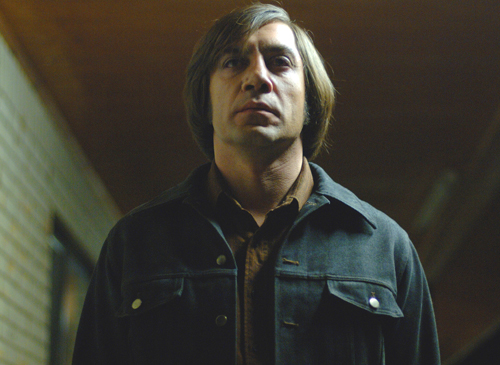
Before I dive too deep in to Anton Chigurh himself, I want to discuss the movie a little to provide some context for the character. Knowing that this movie is about the pervasive threat of death all around us, each character is chosen for a very specific reason in this movie, and their actions and dialogue say a lot about the story the directors want to tell.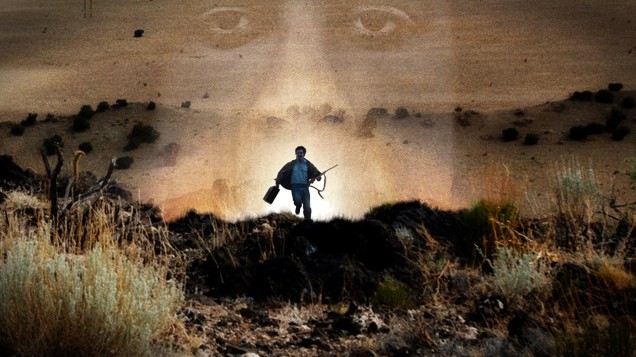
Llewelyn Moss (Josh Brolin) begins the movie by shooting a wild deer from high above and afar, no doubt a skilled hunter and marksman. He therefore qualifies himself as a participant in the game of death, the Coen’s want you to know that. In the same scene he calmly approaches a foiled drug deal searching for el ultimo hombre, the last man standing, curious about the remnants of the deadly struggle he has come across. He is smart enough to know the guy with the money probably tried to escape the way he came in, tracks that man and watches from a distance to make sure the man is incapacitated. Honestly, Llewelyn Moss is a dude you want on your team when the Trump Apocalypse goes down – he is skilled, violent, calm, and street smart – and he holds his own against the literal manifestation of death on earth for most of the movie. But he also makes some mistakes, too, and anything less than perfection is insufficient when you play with death. The Coen brothers want you to know – he is good, but he’s not the king. The main course of action in the movie kicks off when Llewelyn gets soft and returns to the scene of the botched deal to give a dying gang member some water – he’s made a huge mistake. He later turns down a deal with the devil to save his wife when Chigurh offers that he “bring me the money and I’ll let her go. Otherwise she is accountable, same as you. That’s the best deal you’re gonna get. I won’t tell you you can save yourself, because you can’t.” In short, he is a little too cock-sure, not quite ruthless enough, and a little too inexperienced to realize it… not to mention he is handcuffed by his love for his wife, who becomes a bargaining chip. He has lacks the discipline – the system of rules – necessary to elevate his game to the level of the professionals.
How do we know this? Well, Carson Wells (Woody Harrelson) is a bounty hunter who knows Anton Chigurh “every which way”. He is every bit Llewelyn’s equal in the movie, perhaps more, and we know he is impressed with Llewelyn’s skills “you’ve seen him? And you’re not dead? Hmm…” Yet we also know that he recognizes Llewelyn as extremely unqualified for this adventure. Llewelyn: “he won’t find me again.” Wells: “not that way.” Llewelyn: “not any way.” Wells: “…took me 3 hours…” Llewelyn: “yeah, well, I’ve been immobile.” Wells: “no… you don’t understand.” I could write a whole separate piece about how perfectly Wells reflects certain enhanced qualities of Llewelyn (they both were in ‘Nam), an important way the Coen’s show that Llewelyn is out of his league. Llewelyn even realizes this when Wells posits that Chigurh is already on the way to Odessa to kill his wife – how did Wells know his wife was in Odessa? Llewelyn is a surprised that his weaknesses are that obvious. But Wells is not perfect, either. He, too, suffers from over-confidence. When asked about Chigurh he calls him “a psychopathic killer, but so what? There’s plenty of ‘em around”. This underestimate would prove to be a fatal mistake. When Chigurh finally gets the jump on Carson, he pleads for his own life “I could just go home. I’d make it worth your while, take you to an ATM with 14 grand in it, and everyone just walks away”. To Chigurh the logic is silly: “an ATM?” he laughs, as if to remind Carson that money is not his motivation for any of this, saying “you should admit your situation. There would be more dignity in it”. Like death himself, Chigurh is driven by a system and principles – no amount of money can sway that. Wells’ death foreshadows Llewelyn’s. By the time Llewelyn phones Wells, but Chigurh picks up, we know the score. In fact, Chigurh asks Llewelyn “you know how this will turn out, don’t you?” Yes we do… death is undefeated.
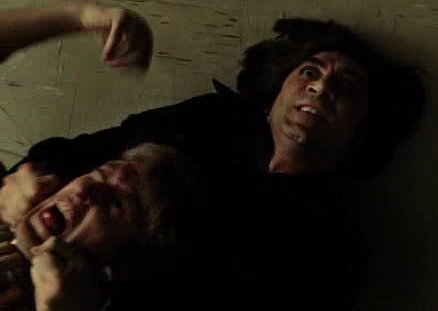
“You pick the one right tool” Chigurh tells Nobody the Accountant after offing his boss. Anton Chigurh is the right tool. Chigurh is not bound by traditional ideas: he shows little regard for the life of innocents, he is barely impeded by traditional symbols of security like door locks, he never shows emotion, and is hardly slowed down by serious injuries like gunshot wounds or compound fractures, performing surgery on himself when necessary. Many people wonder if he is supposed to be interpreted as Death himself or some creature from hell ascendant to Earth. He may be unstoppable, and his awful haircut suggests he doesn’t give a fuck about what anybody thinks. He seems to derive some form of perverted pleasure from killing. He will not hesitate to off an innocent bystander if required, especially with his weapon of choice – a cattle bolt, suggesting he believes others to be less than human. There are many examples of this throughout the movie. The police officer who detained him in the opening scene, a random driver he pulls over to get a new car (twice), a guy driving a pickup that Llewelyn hops in to, the hotel manager. He makes no distinction between good or bad, innocent or guilty, they are all just pawns to him. On several occasions he encounters folks who don’t even stand in his warpath and yet he confronts them, usually unbeknownst to them, with their own mortality. These are important characteristics – collectively, they establish Chigurh as a nearly invincible foe, impervious to classical rules of the western genre, namely that the good guys usually overpower the bad guys in a traditional showdown. Compared to some traditional villains his death count is lower, yet he is more frightening due to his animal-like savagery, random brutality, and complete mastery of the art of violence.
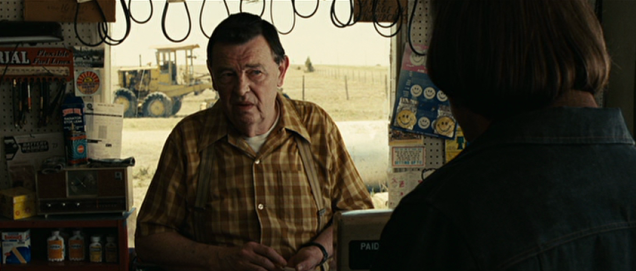
Never is his sinister nature more obvious than the gas station scene, perhaps the best in the movie and one of my favorites of all time. A number of noose-like black, coiled extension cords hang from the ceiling above the store keeper, representing the very real, but disguised presence of death. Chigurh becomes increasingly agitated by a series of small-talk questions asked by the elderly store owner. Chigurh mocks the owner’s fake sincerity and is appalled at the lack of rules “now is not a time, what time do you close? You don’t know what you are talking about, do you?” then suggesting that he might come back to the shop when the old man is asleep. “Why would you do that, we would be closed?” the old man struggles to understand the situation, mirroring a later conversation between Chigurh and Wells. Wells: “do you have any idea how crazy you are?” Chigurh: “you mean the nature of this conversation?” Wells: “I mean the nature of you”. Chigurh nearly chokes when the old storekeeper tells him that he inherited the store through his wife’s family, “you married in to it?!” By now the situation has escalated, it is literally life and death and the store owner has no idea. “What’s the most you ever lost in a coin toss?” Chigurh asks. He is an angel of death, with a series of seemingly random and innocuous events leading him to each present situation. “You know what date is on this coin? 1958. It’s been traveling 22 years to get here. And now it is here, and it’s either heads or tails. And you need to call it” Finally, after correctly guessing the coin toss he gives the man the coin “don’t put it in your pocket, sir! Don’t put it in your pocket….where it will get mixed in with the others and become just a coin…. (almost as an afterthought) which it is”. What I love about this scene is it tells you everything you need to know about Chigurh. If this were a crappy Marvel comic book movie, some stupid FBI agent would walk in and say “Anton Chigurh, he’s the most ruthless and violent man alive!” but the Coen’s and Javier Bardem create a much more vivid picture of a man who, like the quarter, made it through any number of mysterious events and unknown circumstances to stand in front of the shop keeper and put his entire life on the line. Like the uncertainty of death itself, the old man had “been putting it up his whole life” and now here was death in front of him and he had no idea. This is where the Coen brothers are demonstrating the seeming randomness of death. It’s just a coin toss in every gas station we ever stopped at. Please, look this gas station scene up on youtube if you don’t remember it, I promise it’s worth it!
Now that Chigurh’s street cred and violent tendencies have been established, the Coen’s demonstrate that Chigurh is a man of strict rules. “If the rule you followed brought you to this, of what use was the rule?” he asks Wells. In the coin toss scene, Chigurh explains to the old man “you have to call it, I can’t call it for you. It wouldn’t be fair”. Llewelyn’s wife is shocked when Chigurh shows up at her house (right after her mother’s funeral, no less) to kill her and reminds Chigurh that he “doesn’t have to do this” – no one would know but her and Chigurh. He laughs “people always say the same thing” dismissing her plea and explains “I gave my word”, and we know that Chigurh’s will not renege on his promise to Llewelyn. He becomes uncomfortable when Llewelyn’s wife refuses to call the coin toss because she won’t play by his rules. We know how that ultimately ends up for her… Chigurh goes through the familiar motions to check his boots, making sure he didn’t step in any blood on his way out of the house. While his actions may be at times dictated by chance, they are not without reason or purpose, even if we cannot understand the sequence of events that led up to them. 
All of that discussion and I haven’t gotten to who I believe is the protagonist yet. Tommy Lee Jones plays Ed Tom Bell, an aging but clearly hale and sharp Sheriff with a catcher’s mitt for a face and worried way about him. Just like Chigurh, Sheriff Bell shows up at Llewelyn’s trailer shortly after Llewelyn revisits the botched drug deal and is attacked by the drug dealers – he is smart enough to put the pieces together. He sends his deputy to check the trailer first “I’m hidin’ behind you” and immediately spots the indentation where the lock was blasted against the opposite wall by Chigurh’s cattle bolt. “Oh no, well that’s aggravatin’” he says , noticing the milk is “still sweatin’”. They just missed Chigurh, and he sits at Llewelyn’s couch, just like Chigurh did, speculating Llewelyn’s next move, thinking Llewelyn ought to be afraid of whoever is pursuing him because “he’s seen the same things I’ve seen and it certainly made an impression on me”. Had he arrived there minutes earlier by chance he may have even come across Chigurh and who knows what would have happened. When told of the autopsy report of the man Chigurh killed with the cattle bolt, he nervously taps the table and shoves away his food “wasn’t no bullet? Wendall, with all due respect that don’t make much sense… you tellin’ me he shot this boy in the head and then went diggin’ around in there with a pocket knife? I don’t want to picture that.” Sheriff Bell is wise and knows his badge can protect him, but this savage murder along with the botched drug deal signal a change in the way the winds are blowing. When Sheriff Bell talks with his cousin (?) towards the end, he learns that his uncle was gunned down by a gang of Indians in West Texas, in his own doorway decades before. This is no country for old men – it never has been – and it’s hard for him to fathom the level of violence necessary to make it in such a hard country.
Sheriff Bell is no coward. When he comes to the scene of the violent encounter between the drug dealers and Llewelyn he doesn’t wait for backup to check the motel room knowing that he could catch Chigurh, and Sheriff Bell probably would not win that battle. As a man of the law, he feels compelled. Yet Sheriff Bell is afraid during this confrontation with death, and afraid of death in general. He asks his cousin when his uncle died “19 zero and uhhhh 9?” his cousin answers, but Sheriff Bell elaborates “no, I mean was it right away or in the night? When was it?” Sheriff Bell’s father was also a sheriff and died 20 years younger than Sheriff Bell is now. Sheriff Bell recounts a dream he had where he and his father rode from town in to the night, and its cold, snowy, and dark. His father rides ahead through the night carrying embers in a horn to fix a fire, waiting for the younger Sheriff Bell to join him. The night represents dying, and he is afraid of the cold, painful loneliness. He longs for an end to the suffering of the actual act of dying, which he sees as joining his father. I think Sheriff Bell worries that there is no warm fire at the end, too. He says “I always figured when I got older God would sorta come in to my life… he didn’t. And I don’t blame him. If I was him I would have the same feeling towards me that he does.” He knows he is old and his time on earth is limited and the violence rolling through, from the gangs or otherwise, is not a strange situation. His cousin tells him “what you got ain’t nothing new. This country’s hard on people. You can’t stop what’s coming. It ain’t all waitin’ on you. That’s vanity” The world isn’t getting worse, Sheriff Bell is just not young and strong enough to manage it any longer. It’s ok to be afraid, Sheriff Bell, we all are!
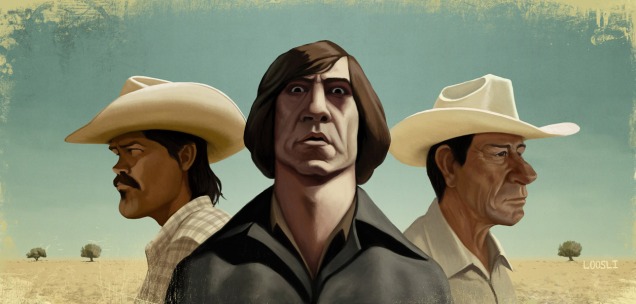
Anton Chigurh is the perfect antagonist for Sheriff Bell. What could be more terrifying for an aging Sheriff afraid to die than an outlaw angel of death in his backyard? Chigurh has already gotten to several men who would have been better stand-ins for Sheriff Bell in his younger years, but now Sheriff Bell is an old man, and he is not cut out for the extreme violence of the younger men. Like Chigurh he abides by rules, more specifically the rule of law and the rule of social niceties like the old man in the gas station. Those rules mean nothing to Chigurh and that scares Sheriff Bell, too. He understands and fears Chigurh’s own system of laws, and especially the ruthless violence with which he follows them. He seems relieved after he is retired. Unlike Llewelyn or Wells, Sheriff Bell recognizes he is no match for death and appreciates, even relinquishes his inadequacy for a thing like Anton Chigurh. “I feel overmatched” he says. He outlived his father, and his uncle was killed by the kind of ultra-violent men that Anton Chigurh represents. You would imagine if Sheriff Bell came across the money that every other character in the movie pursued throughout, he probably wouldn’t take it. He is not the traditional hero of a western movie – no Blondie, no Harmonica, no Will Kane. Rather than pursuing Anton Chigurh, killing him, and exacting some revenge on behalf of the good people in society, he is more than happy to have avoided the conflict and get on with staying alive. He knows that sometimes death just comes to you, and you don’t know it, but other times you go messing with death, and the more times you flip that coin the more likely you are to end up dead. Sheriff Bell is not trying to flip that coin just yet.
Unlike the classical villains of old westerns, Chigurh makes it through this one alive. There is no hero, and it is implied that he continued to wreck havoc after the series of events in this movie.
Hopefully I started out this blog thing with a bang. Let me know what you think, and please go rewatch No Country for Old Men, this time considering what Anton Chigurh does for the story. Call it, friend-o!
 toss? What a way to start, with perhaps my favorite movie of all time. What makes Anton Chigurh great as an antagonist is the contrast he creates with No Country’s protagonist, Sheriff Ed Tom Bell. Wait a second, you mean the protagonist, Josh Brolin aka Llewelyn Moss, right? Nah, but you aren’t far off. I can’t wait to dig deeper on this one.
toss? What a way to start, with perhaps my favorite movie of all time. What makes Anton Chigurh great as an antagonist is the contrast he creates with No Country’s protagonist, Sheriff Ed Tom Bell. Wait a second, you mean the protagonist, Josh Brolin aka Llewelyn Moss, right? Nah, but you aren’t far off. I can’t wait to dig deeper on this one. accomplished athlete, musician, father, and worker. Speak softly and be successful at everything, a Teddy Roosevelt/Justin Timberlake Renaissance Man, if you will. It’s not hard to root for him since I think we can all see a part of ourselves in his everyman persona, so not much of an antagonist is needed. BUT OH, WHAT A DICK BILLY MITCHELL IS. He represents a massive obstacle to Steve Wiebe’s pursuit of success, increasing tension to the climax. JUST LET THE MAN WIN AT SOMETHING FOR ONCE!!
accomplished athlete, musician, father, and worker. Speak softly and be successful at everything, a Teddy Roosevelt/Justin Timberlake Renaissance Man, if you will. It’s not hard to root for him since I think we can all see a part of ourselves in his everyman persona, so not much of an antagonist is needed. BUT OH, WHAT A DICK BILLY MITCHELL IS. He represents a massive obstacle to Steve Wiebe’s pursuit of success, increasing tension to the climax. JUST LET THE MAN WIN AT SOMETHING FOR ONCE!! weak, and never quite ready to take over the empire. Kobe was Sonny – overly brash and short-sighted instead of cold and calculating. And lastly, Dwayne Wade – Michael, just the right mix of aggression and intelligence to lead a mob family, or an NBA team apparently. Michael begins as a protagonist in the first movie, but as he becomes Don Corleone he changes in to a completely different character. I’ll focus more on this metamorphosis and how the contrast between the two Michaels establishes a perfect good guy/bad guy comparison later.
weak, and never quite ready to take over the empire. Kobe was Sonny – overly brash and short-sighted instead of cold and calculating. And lastly, Dwayne Wade – Michael, just the right mix of aggression and intelligence to lead a mob family, or an NBA team apparently. Michael begins as a protagonist in the first movie, but as he becomes Don Corleone he changes in to a completely different character. I’ll focus more on this metamorphosis and how the contrast between the two Michaels establishes a perfect good guy/bad guy comparison later.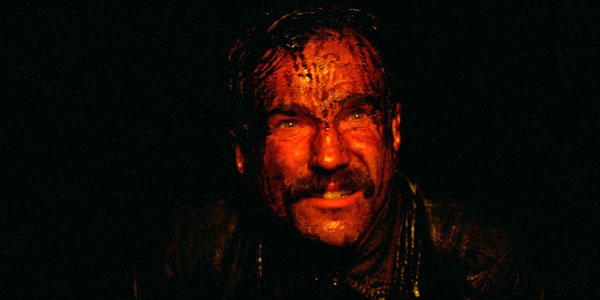
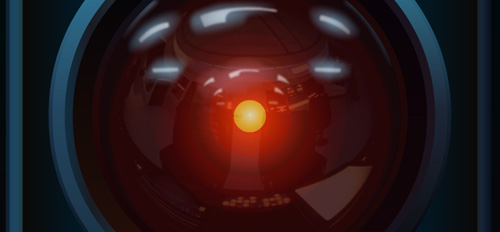
 two of the best movies to come out in the past few years. In a world of participation trophies, JK Simmons forces the viewer by means of the protagonist to confront the most extreme definitions of sacrifice and question whether it justifies the payoff of excellence. Similarly, in a series of escalating conflicts, Tom Hardy undermines the goals that Leonardo DiCaprio pursued throughout the film. Completely different roles, completely different outcomes, similar characters.
two of the best movies to come out in the past few years. In a world of participation trophies, JK Simmons forces the viewer by means of the protagonist to confront the most extreme definitions of sacrifice and question whether it justifies the payoff of excellence. Similarly, in a series of escalating conflicts, Tom Hardy undermines the goals that Leonardo DiCaprio pursued throughout the film. Completely different roles, completely different outcomes, similar characters. of cinema in Se7en. He is potent, competent, singularly focused on the specific flaws of our detective protagonist, and able to force our hero to test his character in an excellent moral dilemma, built through the entire course of the movie to the climatic crescendo.
of cinema in Se7en. He is potent, competent, singularly focused on the specific flaws of our detective protagonist, and able to force our hero to test his character in an excellent moral dilemma, built through the entire course of the movie to the climatic crescendo.